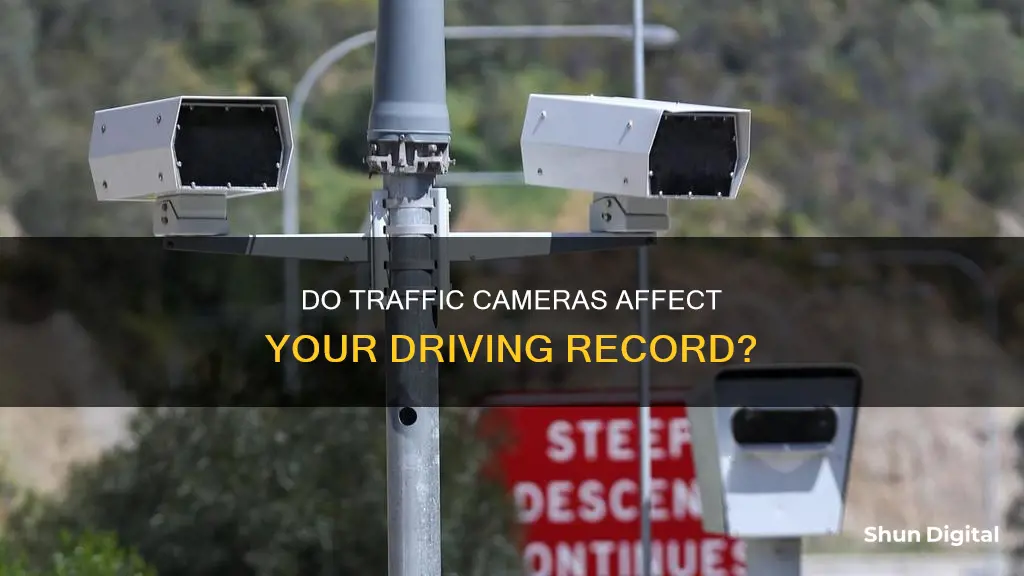
Red light and speeding camera tickets are becoming increasingly common, but do they result in points on your license? In most states, these tickets are treated as non-moving violations, similar to parking tickets, and do not result in points. However, there are a few exceptions. In Arizona, for instance, drivers receive two points for red light camera violations and three points for speeding camera violations. California assigns one point for red light camera infractions, while in Oregon, a red light camera ticket is considered a Class B traffic violation. It's important to note that even without points, these tickets may still carry fines and affect your insurance rates, depending on your state and insurer.
| Characteristics | Values |
|---|---|
| Do camera tickets give you points? | In most states, camera tickets do not give you points. However, in Arizona, California, and Oregon, camera tickets are treated as moving violations and can result in points on your driver's license. |
| Impact on insurance rates | Camera tickets do not affect insurance rates in most states. However, if the camera ticket results in points on your license or is added to your driving record, your insurance rates may increase. |
| Fighting a camera ticket | You can fight a camera ticket by providing evidence that the camera malfunctioned, disputing the owner of the vehicle, or arguing that you had a valid reason for running the red light. |
| Fines | The fine for a camera ticket varies by location but is typically lower than other traffic fines. For example, in Virginia, the maximum fine for a red light camera ticket is $50. |
What You'll Learn
- Camera tickets are treated like non-moving violations in most states, similar to parking tickets
- Red light camera tickets don't add points to your license or impact insurance rates in most states
- Camera tickets are treated as moving violations in some states, which can impact insurance rates
- Red light camera tickets are sent to the registered owner of the vehicle, regardless of who was driving
- You can fight a red light camera ticket by requesting proof of the camera's functioning, or arguing that you ran the red light to avoid an accident

Camera tickets are treated like non-moving violations in most states, similar to parking tickets
Camera tickets, such as those issued for running a red light, are treated differently in different states. In most states, camera tickets are treated like non-moving violations, similar to parking tickets. This means they won't result in points being added to your driver's license or cause your auto insurance rates to increase. However, there are a few exceptions.
In the state of Virginia, for example, a red light camera violation is not considered a moving violation. The maximum penalty for such a violation is a $50 fine, and it will not go on your driving record or affect your insurance rates. The owner of the vehicle is responsible for the ticket, regardless of who was driving, similar to how a parking ticket is handled.
In contrast, if a police officer in Virginia issues a ticket for running a red light, it is considered a moving violation and can result in a fine of up to $350. This type of violation will go on your driving record and may impact your insurance rates.
According to the Insurance Institute for Highway Safety (IIHS), only three states currently treat red light camera tickets as moving violations: Oregon, Arizona, and California. In these states, a camera ticket may result in points being added to your license and increases in your insurance rates.
It's important to note that even if a camera ticket is not considered a moving violation, it may still go on your driving record in some states. Additionally, while camera tickets typically don't affect insurance rates, other factors such as the severity of the violation or previous driving infractions could still impact your rates.
Unlocking Camera Raw: A Quick Guide to Reopening
You may want to see also

Red light camera tickets don't add points to your license or impact insurance rates in most states
Red light camera tickets are a growing concern for drivers, but it's important to understand how these tickets work and their potential impact. In most states, red light camera tickets are treated as non-moving violations, similar to parking tickets or tickets for expired registration. This means they typically do not add points to your driver's license and do not affect your insurance rates.
However, there are exceptions to this rule. Currently, only three states—Arizona, California, and Oregon—treat red light camera tickets as moving violations, which can result in points on your license and higher insurance rates. In Arizona, a red light camera violation carries two points, while in California, it results in one point. In Oregon, a red light camera ticket is considered a Class B traffic violation.
It's worth noting that even if you receive a red light camera ticket in a state where it is considered a non-moving violation, it may still go on your driving record. However, this is not a common occurrence. Additionally, the impact of a red light camera ticket on your insurance rates may depend on your previous driving record and the type of license you hold. For example, if you have a G1 or G2 license in Ontario, multiple demerit points can lead to a license suspension, which can affect your insurance rates.
While red light camera tickets may not directly impact your insurance rates in most states, it's always a good idea to practice safe driving habits and obey traffic laws to avoid fines and keep your driving record clear.
Understanding Shadow Clipping in Camera Raw
You may want to see also

Camera tickets are treated as moving violations in some states, which can impact insurance rates
Camera tickets are usually treated as non-moving violations, which means they are on the same level as parking tickets or tickets for expired registration. However, in some states, camera tickets are treated as moving violations, which can impact your insurance rates.
In most states, camera tickets for speeding or running a red light will not raise your car insurance rates. This is because "automated enforcement citations" are generally seen as civil or administrative violations that do not result in points on your driver's license or go on your driving record. As a result, your insurance rates are unlikely to increase.
However, there are a few exceptions. In Arizona, California, and Oregon, camera tickets are treated as moving violations. In these states, a camera-issued ticket for running a red light or speeding can result in points on your license and increases in your insurance rates. For example, in Arizona, a red light camera violation will add two points to your license, while a speeding camera violation will add three points. In California, a red light camera infraction will add one point.
It's important to note that even if you receive a camera ticket in a state where it is considered a non-moving violation, you may still have to pay a fine. Additionally, while camera tickets may not directly increase your insurance rates, having multiple moving violations on your record could impact your rates.
If you receive a camera ticket, it's always a good idea to review the laws and regulations in your state to understand how it may affect your driving record and insurance rates.
Motorola Cameras: Where Are They Manufactured?
You may want to see also

Red light camera tickets are sent to the registered owner of the vehicle, regardless of who was driving
Red light camera tickets are typically sent to the registered owner of the vehicle, regardless of who was driving. This is because red light cameras are often unable to identify the driver of the vehicle. However, the laws regarding these tickets vary depending on the state.
In some states, such as Virginia, the owner of the vehicle is responsible for the red light violation, even if they were not driving. This is similar to how a parking ticket works. In other states, the driver of the vehicle is responsible for the violation. Many states allow owners who receive tickets to submit an affidavit stating that they were not driving when the violation occurred, which usually results in the dismissal of the ticket.
Red light camera tickets are issued when a vehicle passes over a sensor in an intersection during a red light, triggering a camera to capture photo and/or video footage of the vehicle, its license plate, and the driver. The ticket is then mailed to the registered owner of the vehicle and includes information such as the date, time, and location of the violation, as well as copies of the photographs.
While red light camera tickets do not usually add points to your driver's license or result in insurance increases, they can be costly. The penalty for these tickets varies depending on the location, but it typically includes a fine. For example, in Ontario, the standard fine is $260 plus a $65 Victim Fine Surcharge, totaling $325. In Virginia, the maximum penalty is $50, while in California, the base fine for running straight through a red light is $100.
Traffic Camera Tickets: Valid in Miami-Dade County?
You may want to see also

You can fight a red light camera ticket by requesting proof of the camera's functioning, or arguing that you ran the red light to avoid an accident
Red light camera tickets are usually issued when a vehicle passes over a sensor in an intersection while the light is red, triggering a camera. The cameras take pictures that typically show the vehicle's license plate and the driver. Many camera systems also take video footage of the vehicle driving through the red light.
Red light camera tickets don't always result in points being added to your driver's license. In fact, most states treat camera tickets like non-moving violations, such as parking tickets or tickets for expired registration. However, there are exceptions, such as Arizona, California, and Oregon, where red light camera tickets are considered moving violations and can result in points.
If you want to fight a red light camera ticket, you can start by reviewing the photos and videos provided with the ticket. You can also request additional evidence from the prosecutor, such as witness lists. In some cases, you may be able to argue that you weren't the one driving the vehicle or that the photos and videos don't clearly show a violation.
Another strategy for fighting a red light camera ticket is to argue that you ran the red light to avoid an accident or to prevent a serious traffic jam. In such cases, you can argue that you did not willingly break the law, and the judge may consider mitigating circumstances.
Additionally, you can challenge the reliability of the camera by requesting proof that it was functioning correctly at the time the picture was taken. The prosecution has the burden of proving beyond a reasonable doubt that the camera was in proper working condition. If they cannot provide sufficient evidence, their case may be weakened.
Mastering Rocket League Camera Settings: A Guide
You may want to see also
Frequently asked questions
It depends on the state. In most states, camera tickets are treated like non-moving violations, similar to parking tickets, and do not add points to your driver's license. However, in Arizona, California, and Oregon, camera tickets are considered moving violations and can result in points being added to your license.
A moving violation is an offense that occurs while a vehicle is in motion, such as speeding or running a red light. A non-moving violation, on the other hand, is an offense that is not related to the movement of a vehicle, such as a parking violation or an expired registration.
In most states, camera tickets do not affect car insurance rates. However, in Arizona, California, and Oregon, where camera tickets are considered moving violations, they may result in increased insurance rates.
You have the option to pay the fine or contest the citation. Paying the fine will not result in points being added to your license or an increase in your insurance rates, as camera tickets are generally treated as civil or administrative violations. However, if you believe the ticket was issued unfairly, you may choose to contest it.
There are several strategies you can use to contest a camera ticket:
- If you were not the driver, you can file an affidavit stating that you were not the one operating the vehicle at the time of the violation.
- You can request proof that the camera was functioning properly and calibrated correctly at the time the violation occurred.
- Check if there were clear and visible signs posted indicating the presence of a red light camera within the required distance from the intersection.
- Provide evidence that you were instructed to run the red light, such as being part of a funeral procession or making way for an emergency vehicle.







